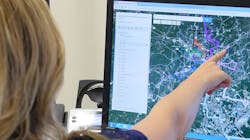GoTriangle’s Route 700 takes a detour to help those vulnerable to pandemic
Durham, N.C., city and county officials had been working to find a new non-congregate shelter for about 40 homeless people who are especially vulnerable during the COVID-19 pandemic due to their age or underlying health conditions.
In partnership with the nonprofit Urban Ministries of Durham, two hotels in Durham agreed to help provide socially distanced housing for these individuals. But officials quickly realized the two hotels were not near bus stops, making it more difficult for this group to access the additional resources they need.
At the recommendation of a non-profit partner, Durham County Government Chief of Staff Drew Cummings emailed GoTriangle to ask about adding one or two temporary bus stops to serve the people at the hotels.
GoTriangle Transit Service Planning Supervisor Jennifer Green responded the very next day, asking, “What is the timeframe for needing bus service there?”
Upon hearing that the people were being moved to the hotels in a matter of days, Green set to work. By July 17, GoTriangle had launched a Route 700 detour that now accesses three new bus stops near the hotels. GoTriangle’s speed at creating the stops took teamwork from several departments. Planners and operations staff identified a potential detour for the route that could be put in place very quickly. Safety and amenities staff headed out to find safe places for the new bus stops. Service planners estimated the best bus schedules by finding out when clients would most likely need service. Operations trained bus drivers on the new routes.
“I greatly appreciate your flexibility in making this happen,” Cummings wrote to Green after the route detour was launched. “For a big government system, this counts as turning on a dime.”
The Route 700 detour could last up to a year or more. It all depends on the pandemic, as Durham City and County work to provide shelter to those without homes and to keep everyone safe.
For the elderly and others who are vulnerable to the pandemic, transit is a lifeline to a variety of services, says Shona Wynn, residential operations director for Urban Ministries of Durham. Although the nonprofit provides meals for homeless people, they lack transportation, she says.
“Some do work,” Wynn says of the nonprofit’s clients. “We provide all meals, seven days a week, so a lot of the need for transportation is for doctors’ appointments. They also have appointments with their case managers here at the shelter. We also provide them with other resources.”
The Route 700 now runs every 30 minutes until 6:30 p.m. weekdays and hourly in the evenings and on weekends. The route connects from Durham Station, a transit hub that allows clients to access GoDurham buses and head to Urban Ministries for additional resources.
Urban Ministries’ clients do like to use transit, Wynn says, adding, “They are really good about using the bus system.”


